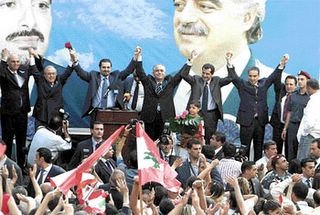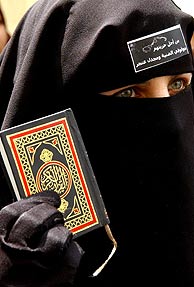Haswa. Four US soldiers were killed Monday after they were attacked in Haswa, 30 miles south of Baghdad. The soldiers were assigned to the 155th Brigade Combat Team, II Marine Expeditionary Force
Canberra. Australian soldiers to be withdrawn from Iraq in eight months. Australian troops deployed to southern Iraq may be withdrawn in 8 months as they are replaced by Iraqi forces, says General Peter Cosgrove of the Australian General Staff. General Cosgrove also announced that his son Philip had been wounded in Iraq in a roadside bombing in January 2005.
Amman. Daughter of Saddam Hussein "outraged" by photos of her father. Raghad Hussein is outraged by the prison photos of her father. Raghad, and her sister Rana and their 9 children went into exile in Jordan on 31 July 2003. Their mother, Sajida and the third sister, Hala, live in Qatar.
Baghdad. Former Premier Iyad Allawi claims that al-Qaeda Number 2 Ayman al-Zawahiri visited Iraq in 1999. Allawi adds that Abu Mussab al-Zarqawi entered Iraq at about the same time to establish links with Ansar al-Sunna. Allawi says al-Zawahiri entered the country under a false name to attend the
9th Popular Islamic Conference held in September. Allawi claims that Farouk Hijazi, former Iraqi ambassador to Turkey, was named by Saddam to liaise with Islamist organizations. [Is this the truth? Are King Abdullah and tag teaming in setting up the Saddam-al Qaeda link?--Nur]
Paris. French Foreign Minister Michel Barnier will hold talks with the UN Special Representative to Iraq Achraf Qazi on preparations for the 22 June conference on Iraq.
Samarra. Three suicide carbombs target a US base in Samarra, wounding four GIs.
Kirkuk. Two Kurds were killed and five others wounded by mortar fire.
22:37 Baghdad. Mass arrests; 366 rounded up in the western quarters of the capital. American combat helicopters and warplanes shadowed the operation as US and Iraqi troops conducted house-to-house searches.
21:50 Jerusalem. Israeli troops use Palestinian adolescent as human shield. Israeli TV broadcasts the incident, filmed last week on the West Bank. The Israeli Supreme Court has declared the use of human shields as illegal.
20:55 Tal Afar. Carbomb kills 20. At least 20 people are dead and 25 are wounded in a dual carbombing in Tel Afar. The target was local Shi'a politician Hassan Baktash, a Shiite Muslim with close ties to the Kurdistan Democratic Party,
19:27 An Iraqi-American, who an Internet statement claimed has been killed for being a U.S. military pilot, is a businessman who returned to Iraq 18 months ago and disappeared last week, his brother said Monday. Neenus Youssef Khoshaba has been missing since Tuesday when he left his Baghdad family home to attend a business meeting, said his elder brother, Boulus. "I heard in the news that he was killed," the brother said. On Sunday, a statement purportedly released by the al-Qaida in Iraq terrorist group claimed it had killed Khoshaba for being an American pilot who had bombed mosques and civilians. The group claimed to have kidnapped Khoshaba and posted photos of an Illinois driver's license of a 56-year-old man from Skokie, Illinois, and hotel and airline privilege cards. "After interrogating him, it was revealed it was he who bombed a number of mosques (and) the hotel Ishtar Sheraton in Baghdad during the invasion, as well as bombing a number of civilian homes," said the statement. "After finishing the interrogation, God's ruling was executed," it added. "He has nothing to do with the military. He works in business," said the brother, adding he was too old to be a military pilot. Boulus Khoshaba said his family had received a call from a man claiming to be Egyptian asking about his brother. After finishing high school in 1969, the missing man left Iraq to the United States where he lived in Illinois and studied computer science before moving to Saudi Arabia, where he worked for more than two decades. Khoshaba, who was still using his Iraqi passport, returned to Iraq to live with his mother and brother in Baghdad about 1 1/2 years ago after his wife died of cancer.
19:26 Washington. President George W. Bush will insist that Palestinian leader Mahmoud Abbas dismantle all terrorist networks in Palestinian areas when they meet at the White House on Thursday, Secretary of State Condoleezza Rice said. In a rousing pro-Israel speech at a policy conference of the American Israel Public Affairs Committee, Rice said Monday "the president will be clear that there are commitments to be met, that there are goals to be met." She said Israel had obligations as well, and that Bush, having shunned Yasser Arafat, will build with Abbas "a relationship that is based on the good faith that only democratic leaders can bring." As Rice spoke, Sharon was in New York, rallying American Jews to support his plan to withdraw all Israeli Jews and troops from Gaza and to turn over the area to the Palestinians _ a move endorsed by the Bush administration. Protesters accused Sharon of giving in to violence and said more Israeli territorial withdrawals would follow.
19:16 Baghdad. Iraq's Islamic Party, the main Sunni political movement, warned against politicizing the security forces.
We, the Islamic Party, condemn all forms of terrorism, whether it targets individuals, groups or governments. At the conclusion of their meeting, Sunni notables reaffirmed their opposition foreign occupation and maintained that resistance is legitimate.
19:16 Mahmoudiya. A car bomb exploded outside Hussaynia Fadlallah al-Abbasa, a Shi'ite mosque south of Baghdad, killing five people and wounding 19, most of them children, hospital officials said. Witnesses said the blast caused the building to collapse, killing five inside. Doctors at nearby hospitals said 11 of those wounded were children. Several other aging structures also tumbled.
19:15 Ottawa. Amnesty International plans to "adopt" US deserter Jeremy Hinzman, who has saught refuge in Canada after he refused deployment to Iraq.
19:14 Baghdad. The new Constitution will restore stability to Iraq only if the rebels and other groups not represented in the government acquire a genuine political role, said Hadjim al Hassani, National Assembly Speaker, in an interview with Reuters.
19:10 Baghdad. Death toll rises to 13 in restaurant bombing. 126 are wounded.
18:55 Jerusalem. Less than 100 settler families out of 1,700 on the Gaza Strip have registered for an indemnity. Settlers who refuse to leave their residences voluntarily before 20 July will see their indemnity reduced by one-third. The total cost of the pullout is projected to be $1.5 billion.
18:51 Teheran. Fearing a boycott after all reformist candidates were disqualified from Iran's upcoming elections, the country's supreme leader ordered Monday the applications of some candidates be reviewed, state-run television reported. The Guardian Council, the hardline constitutional watchdog which vets the election candidates, rejected on Sunday all the reformists who'd registered to run in next month's presidential elections. Only six out of more than 1,000 hopeful candidates were approved, and those six were not from the reformist camp. "It's appropriate that all individuals in the country be given the choice from various political tendencies," said Supreme Leader Ayatollah Ali Khamenei in his decree addressed to Guardian Council chief Ayatollah Ahmad Jannati. "Therefore, it seems that (the) qualification of Mr. Moin and Mr. Mehralizadeh be reconsidered," the television quoted Khamenei's decree as saying, referring to the two most prominent reformists disqualified, Mostafa Moin and Vice President Mohsen Mehralizadeh. Khamenei's call is unlikely to appease the reformists, who have slammed the council's vetting policies as illegal.
18:39 New York. US Secretary of State Condoleezza Rice offered her unwavering support to the Israeli plan for a pullout from the Gaza Strip and called upon Israelis and Palestinians to "fulfill their obligations". Rice spoke before the annual meeting of the American Israel Public Affairs Committee (AIPAC).
18:17 Dubai. Ansar al-Sunna announced the execution of two Iraqi and a Jordanian truck drivers who worked for the US military in Iraq. Jordanian Hammad Ismaël Al-Sanee was ambushed while transporting supplies from the port of Aqaba to US bases in Iraq. Iraqis Khaïri Abdel Majid Ftouh and Faran Faëq Fadhel were ambushed as the left the US base at Al-Assad, the largest in Iraq, where they had delivered electrical equipment. A video of the executions was uploaded to the Internet.
17:21 Mosul. Three US soldiers were killed in separate incidents in Mosul on Sunday. A fourth was killed by an explosive device near Tikrit.
16:33 Baghdad. Ali "Ford", an auto mechanic specialized in repairing Ford automobiles, wounders how he is going to the family of this apprentice that the fellow was killed in the bombing of the Habayebna Restaurant on Monday. Government sources say 113 were wounded and 4 killed in a bombing in the Shi'ite Jamila quarter of Baghdad. The blast left a crator where the restaurant formerly stood.
Usually Sadr City police eat here every day but today not one of them showed up, said an eye witness. The restaurant had received threats because police were frequent customers.
16:03 Jerusalem. Palestinian Interior and Security Minister Nasr Yussef is to meet on Monday evening with Israeli Defense Minister Shaoul Mofaz for talks on the handover of security responsibilities on the West Bank and in the Gaza Strip.
16:02 Brussels. European express concern over preparation for Iranian elections. Of 1,008 candidates only six have been approved to run [This track record is superior to that of Egypt--Nur]. Europe believes reform candidat Mostapha Moïn should be permitted to run. In addition to the candidature Mr. Rafsanjani, former president, the Council of Guardians has approved four conservatives and a reformer, Mehdi Karoubi, a distant relative of outgoing President Mohammad Khatami.
15:30 Baghdad. Death toll is four in restaurant bombing.
15:18 Brussels. Italian Defense Minister Antonio Martino reiterates that in the medium-term, Afghanistan is in worse shape than Iraq.[Whew--that must be bad!--Nur]
14:50 Ft. Hood: Court martial of Shane Werst, 32, accused of murdering Iraqi prisoner Naser Ismail after a sweep through a neighborhood.
14:19 Bucharest. Kidnapped reporters return home. A Romanian military aircraft repatriated three reporters to a military base near the capital, Bucharest. The base was sealed off to the public. Their guide and interpreter, Mohammed Minaf, is in custody in Baghdad where he is being questioned by coalition forces. Romanian President Traian Basescu says no ransom or political concession was made to the kidnappers.
13:39 Baghdad. Carbombing in Shi'ite neighborhood has killed or injured at least 52 people. The detonation took place in the Jamila district near a crowded restaurant. The blast set parked cars ablaze.
12:28 Baghdad. Carbombing in Shi'ite neighborhood. A car stuffed with explosives blew up near a restaurant in a busy Baghdad neighborhood.
11:22 Brussels. EU foreign ministers condemn Uzbekistan for its refusal to accept an investigation into the bloody repression during a recent popular uprising.
10:45 Baghdad. Anti-terrorism chief assassinated. General Wael Rubaye was assassinated in the Mansur district of the capital by unarmed gunmen as he was being driven to work.
08:29 Kirkuk. Truck bomb kills 4 civilians. A truck bomb targeted the residence of a municipal administrator this morning in Tuz Khurmatu, south of Kirkuk, killing four and wounding four others. The official was unharmed.
07:08 Samarra. Iraqi insurgents fired 10 mortar rounds at an Iraqi police and army base. Two soldiers were killed and a third wounded.
01:10 London. Colonel Jorge Mendonca faces court martial for prisoner abuse in Basrah in an operation known as Ali Baba. If Col. Mondonca is found guilty, he will be the first British commanding officer sentenced for criminal misconduct since 1950.
01:01 Baghdad. Sunni leaders reopened the debate on the murders of Sunni clerics, blaming Interior Minister Bayan Baqer Sulagh, a Shi'a, for mosque raids and arrests of imams and worshipers alike during a conference assembling 1,000 Sunni notables. Sulagh had previously declared that he would make a "deal with the devil" to defeat terrorism. Sunnis demanded an independent commission of inquiry into the murders.










